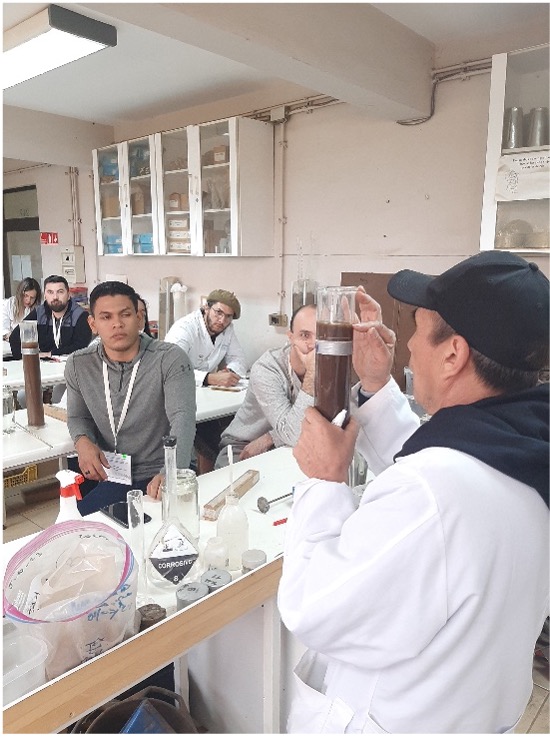Soil laboratories in Latin America and the Caribbean join forces: Strengthening capacities and improving standards
Representatives from approximately 60 soil laboratories across 23 different countries attended the Latin American Soil Laboratory Network (LATSOLAN). The gathering kicked off in Santiago de Chile on 8 April and continued with sessions in Chillán from 9 to 11 April. The workshop entitled “Pathways to precision in soil analysis: advancing soil laboratories in Latin America and the Caribbean” aimed to advance soil analysis in the region through collaborative efforts between LATSOLAN members.

The workshop was conducted within the framework of the Global Soil Laboratory Network (GLOSOLAN), launched in 2017 as part of the FAO and its Global Soil Partnership (GSP). It was jointly organized by the FAO Regional Office for Latin America and the Caribbean, the Chilean Ministry of Agriculture, the University of Concepción in Chile (UdeC), the Chilean Soil Science Society, and the Chilean Soil Laboratory Network (RENALASCH).
 The event was opened by Mr Mario Lubetkin, FAO Regional Representative for Latin America and the Caribbean. H.E. Esteban Valenzuela, the Minister of Agriculture of Chile, also participated in the opening ceremony of the workshop. He highlighted the commitment of the Chilean Government to protecting soil and water resources and promoting their sustainable management. Mr Lifeng Li, Director of the FAO Land and Water Division, underlined the key role of soil laboratories: “with accurate soil analysis we will be able to effectively manage our soils for food security and climate change mitigation. Our aim is to enhance countries to generate high-quality soil data and information, serving as foundation to build soil information systems”.
The event was opened by Mr Mario Lubetkin, FAO Regional Representative for Latin America and the Caribbean. H.E. Esteban Valenzuela, the Minister of Agriculture of Chile, also participated in the opening ceremony of the workshop. He highlighted the commitment of the Chilean Government to protecting soil and water resources and promoting their sustainable management. Mr Lifeng Li, Director of the FAO Land and Water Division, underlined the key role of soil laboratories: “with accurate soil analysis we will be able to effectively manage our soils for food security and climate change mitigation. Our aim is to enhance countries to generate high-quality soil data and information, serving as foundation to build soil information systems”.
The event provideda unique and valuable opportunity to materialize various initiatives involving soil laboratories. Specifically, participants from Central American countries were invited to participate, as the workshop was recognized as a regional component of the project on “Soil mapping for resilient agrifood systems in Central America and sub-Saharan Africa (SoilFER)”. Moreover, laboratories operating in the Caribbean had the opportunity to attend parallel sessions focused on the measurement of key soil chemical, physical and biological parameters, which are considered primary indicators in the SOILCARE project (Multicounty Soil Management Initiative for Integrated Landscape Restoration and Sustainable Food Systems, implemented in the Caribbean Small Island Developing States). The project "Sustainable Soil Management through the Soil Doctors Programme and the Global Network of Soil Laboratories" financially supported by PhosAgro played a key role in organizing the workshop. It also made a significant contribution to GLOSOLAN's ongoing efforts to build the capacity of laboratories.
 Thanks to the commitment of the LATSOLAN Steering Committee and the staff of the Faculty of Agriculture of UdeC, participants engaged in practical laboratory sessions to enhance their capacity in analyzing soil physical and biological parameters. A field session was arranged to assess soil micro- and meso-fauna. Mr. Filippo Benedetti, GLOSOLAN coordinator, emphasized the importance of quality control in the laboratory practices. Special attention was given to the application of spectroscopy in soil analysis, including an overview of its current advantages and future prospects. At the end of the workshop, participants committed themselves to disseminating the knowledge gained to their colleagues, thereby anticipating a broader impact across the region. This commitment is expected to support the continued growth of LATSOLAN and facilitate additional capacity development opportunities among soil laboratories in the region.
Thanks to the commitment of the LATSOLAN Steering Committee and the staff of the Faculty of Agriculture of UdeC, participants engaged in practical laboratory sessions to enhance their capacity in analyzing soil physical and biological parameters. A field session was arranged to assess soil micro- and meso-fauna. Mr. Filippo Benedetti, GLOSOLAN coordinator, emphasized the importance of quality control in the laboratory practices. Special attention was given to the application of spectroscopy in soil analysis, including an overview of its current advantages and future prospects. At the end of the workshop, participants committed themselves to disseminating the knowledge gained to their colleagues, thereby anticipating a broader impact across the region. This commitment is expected to support the continued growth of LATSOLAN and facilitate additional capacity development opportunities among soil laboratories in the region.
Link to video recordings:
